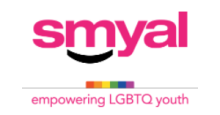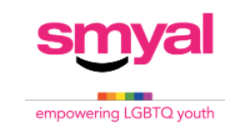This July, it is our honor to highlight board member and major donor, Raffi Freedman-Gurspan.
Raffi joined SMAL’s Board of Directors in 2019. She currently serves as the Deputy Director for the All on The Line campaign of the National Redistricting Action Fund. Previously, she held positions with the National Center for Transgender Equality, and was the first openly transgender staffer to work at the White House during the Obama administration.
What brought you to SMYAL?
SMYAL reminds me so much of BAGLY, a sibling LGBTQ youth organization in my hometown of Boston, that provided a lot of resources and support during my adolescent years when I came out. As a transgender woman of color, SMYAL’s commitment to LGBTQ youth, especially those of color and those living in poverty, immediately caught my attention given my values and my own experiences. For example, when I was the last LGBTQ Liaison at the Obama White House, I worked on many initiatives related to LGBTQ youth and poverty, especially housing, where I helped oversee the implementation of the Equal Access Rule of the Department of Housing and Urban Development. This rule mandated that any housing/shelter service provider receiving federal funding must adhere to strict non-discrimination policies against LGBTQ people, including youth in shelters. So it was natural after that experience, I could not say no to joining the Board of SMYAL to continue to support the ongoing anti-poverty work.
What inspired you to get involved with the organization as a board member and major donor?
For me there are three major components of SMYAL’s work that inspired me to become a major donor. First, SMYAL’s housing program is so critically important – now more than ever. When I came to the grand opening of the latest house in 2019, I was so moved to see how beautiful the home was, how thoughtful the staff was about creating a safe environment for our kids, and I thought about all the youth who would be living and growing there. Second, the Little SMYALs program, focused on young LGBTQ youth and creating community not only for the little ones, but also for their parents, was very inspiring. I thought of my own experience as a young child and wondered, if a program like Little SMYALs existed when I was in elementary school, could I have come out sooner and would we have been able to create a more tolerant society earlier? It’s so moving to see how this program has impacted the youngest in our community. Lastly, SMYAL’s work in the local DMV public schools with school officials, teachers, student organizations, etc., is vital if we are going to ensure that the next generation of queer youth are affirmed, supported, and, frankly, can have a better childhood and adolescent experience then many of us from earlier generations. To me, it’s about giving back at the end of day, an obligation to both pay it forward and back simultaneously.
You served as the LGBT liaison in the Obama administration and were the first openly transgender White House staffer. Can you tell us what those experiences were like? Do you have a story or two that you can share?
I never planned or anticipated to work in the White House. Ever. And yet, I was recruited by the Obama Administration, and how could I say no to them? Especially, since I was brought on board at the tail end of Obama’s presidency (2015), and he had done so much up to then for our community. I actually was first hired to work in the Presidential Personnel Office where I was a recruiter for the administration to find talented folks from all backgrounds to serve in various positions in the government. That was an incredible experience but then, in 2016, I was asked to take on the additional role of liaison to the LGBTQ community. My boss was Valerie Jarrett, an extraordinary, inspiring, woman of color who ran the Office of Public Engagement. One of my favorite memories is when I escorted Valerie and her team up to New York City for the unveiling of the Stonewall National Monument in Greenwich Village. This was the first LGBTQ national monument in the National Park system ever. That day, several weeks after the horrible Pulse Night Club shooting, we commemorated those we lost but then transitioned to celebrate our queer history, affirm LGBTQ Americans’ place in our nation, and display proudly the diversity within our community. We danced all afternoon in the streets. It still brings tears to my eyes when I remember that wonderful day.
You currently work with All On the Line, an organization chaired by former US Attorney General Eric Holder. What motivates you to do this work to end gerrymandering and why should we be concerned with redistricting, especially in an election year like this one?
One of the core reasons that we still don’t have LGBTQ civil rights protections in this country – both at the state and federal level – is because of partisan gerrymandering, a practice by which one party in control of a state legislature (or in some cases commissions) manipulates the drawing of state and congressional representative district maps to ensure incumbents or only one political party is able to retain control. Simply put, it means politicians are choosing their voters, not voters choosing their representatives, the way our Constitution intended. In places where anti-LGBTQ extremism has taken root, this has meant that pro-equality LGBTQ legislation and policies have been blockaded. For example, in Ohio, Pennsylvania, Arizona, and Florida, even though the vast majority of voters support equality for our community. At the Federal level, this has meant slow traction on legislation like the Equality Act, although last year the bill was finally passed by the House of Representatives. We still need the Senate to pass it. Therefore, the reason I got involved with All On The Line, the grassroots effort to organize communities across the country to combat gerrymandering led by former Attorney General Eric Holder, is in part because I know until we uproot gerrymandering, LGBTQ equality will not be guaranteed.
How are you staying connected to your community and the causes that matter to you during these difficult times?
I am really lucky to live in the District of Columbia, a jurisdiction that has a large, vibrant, and diverse LGBTQ community, and through my past and current work, I have connections to LGBTQ communities across the country from Seattle to Key West, so I feel like I have my pulse on what is happening across the nation for our people. By serving on boards like SMYAL’s, by continuing to advise folks engaged in direct LGBTQ advocacy and service provider work, and through working at an organization such as All On The Line, I’m able to stay connected. I will admit, I did take a bit of “a frontline break” in the past year, but I think that’s healthy. Sometimes we need to recharge, focus on other areas of our professional and personal lives, but remain committed to the cause. I like to say that since I was once an LGBTQ youth – I came out at the age of 12 – the LGBTQ movement raised me in many ways. For that I am indebted and will always be with you all.
As an activist, what advice do you have for young queer leaders who are just getting started?
My biggest piece of advice is to not box yourself only into LGBTQ identity or activism work. Because we are an intersectional movement, it’s important to have our leaders not only feel obligated to “the queer movement,” but to find opportunities and avenues to bring about change in other places, other movements, and in new innovative ways. For example, I have met hundreds (if not thousands) of young LGBTQ leaders across the country who ask me if they should give up their dreams to be a scientist, a doctor or an environmental activist, in order to serve the LGBTQ community. I usually respond ‘absolutely not’ – we need queer people to be everywhere, to be examples to each other, to the cisgender/straight community, and the next generation of leaders, that our possibilities, as openly and proud queer folks, are endless. Yes, we need people to be working at places like SMYAL, but we also need those clients we serve to dream big and reach for the stars. That is how equality – lived equality – will take root in our nation. It’s happening already – it’s incredible to see LGBTQ people in all different sectors: we have LGBTQ business leaders, LGBTQ legislators, LGBTQ teachers, doctors, scientists, techies, I could on and on. So queer leaders should devote what time and energy they can to the cause but then also make room for others, take care of themselves, and find new ways to continue to support the movement even when they might move on to other great opportunities.




